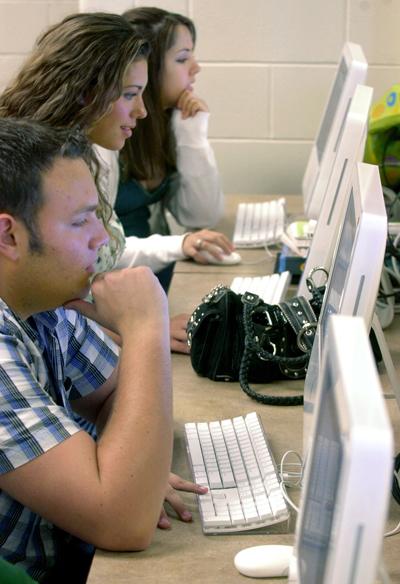Think you won’t get noticed slacking off in that online class? Think again. Following the lead of a national study, Cerritos College has conducted its own research regarding the popularity of distance education courses.
The result: enrollment in online classes is increasing with no hint of slowing down.
Also included in the study were success and retention rates that college administrators want to improve. One option: cutting back on or even eliminating courses that bring those averages down.
Based on findings in the 2009 Sloan Survey of Online Learning, online enrollments in colleges nationwide increased 17 percent in Fall 2008 from the previous year, with about 4.6 million students taking at least one online course in the Fall 2008 term.
The study, aimed at answering some of the fundamental questions about the nature and extent of online education, surveyed more than 2,500 colleges and universities.
On a local scale, while enrollment in online courses continues to increase at Cerritos College, retention rates were below the statewide average and success rates were higher by one percent for Fall 2009, as reported by Dean of the Library and Learning Resource Center Carl Bengston.
Bengston, whose one of many duties for Cerritos’ Innovation Center is to oversee the quality aspect of teaching distance education courses, has already presented these findings to the college’s Board of Trustees.
While a comprehensive analysis of the distance education program at Cerritos is next on his agenda, his main goal is to “find out what factors influence student success in Distance Ed classes and what, if anything, can be done to improve retention and success rates,” he said.
This means possibly determining that a subject area is not a good area to offer distance education courses in.
At this point, there is still much speculation as to why students are not as successful outside of the classroom.
“It could be that we’re just offering online courses in areas where it’s more difficult to be successful in an online mode. I have to do more data analysis to try and see if we can get a handle on that,” Bengston said.
Although some instructors currently experience similar success and retention rates in their virtual classrooms as in their real ones, many are glad to see that online students are generally performing better each semester.
Dr. Kimberley J. Duff, Associate Professor in the Psychology Department, attributes this to the fact that “often times a student would only take one online course, but now students are more familiar with taking online courses and what is required of them.”
Other instructors say that success rates in their online courses are on the rise because their retention rates are taking a dip: students drop courses early on if they realize they are behind on the work, or they are dropped for doing poorly.
History instructor Susan Oliver has observed that in her courses, generally “70 percent of the students in both the online and on campus courses earn a ‘C’ or above. In the online class, a greater number earn an ‘A’ or ‘B’. However, in each case, the distribution reflects the fact that students who are earning less than a ‘C’ either drop the class or I drop them,” she said.
Some students have expressed the sentiment that online courses can be more challenging and time-consuming than on-campus courses.
“It’s more difficult to keep up; you have to be super independent,” said Vanessa Walta, Nursing major, who is currently enrolled in an online English 100 class.
“It was the only (section) left open and I was disappointed there were no on-campus (sections) open,” she added.
Other students are taking a proactive approach to succeeding academically by simply not looking into online courses.
Education major Jessica Guzman said, “I would get distracted easily and play music; I like when an instructor teaches me.”
Despite issues turning students away from online courses, enrollment in these classes has increased from 5,008 students in Fall 2009 to 7,491 students this semester, based on Bengston’s research.
Faculty and instructors are ready to do what is necessary to increase retention rates and help distance education students succeed in their courses.
William Farmer, Jr., Vice President of Academic Affairs and Assistant Superintendent of Academic Affairs, anticipates this preliminary research will only strengthen the distance education program at Cerritos College.
“I think distance education at Cerritos is in a healthy state. We have a good distance learning infrastructure and strong leadership from (Bengston), an excellent faculty, and a committed support staff,” Farmer said.








